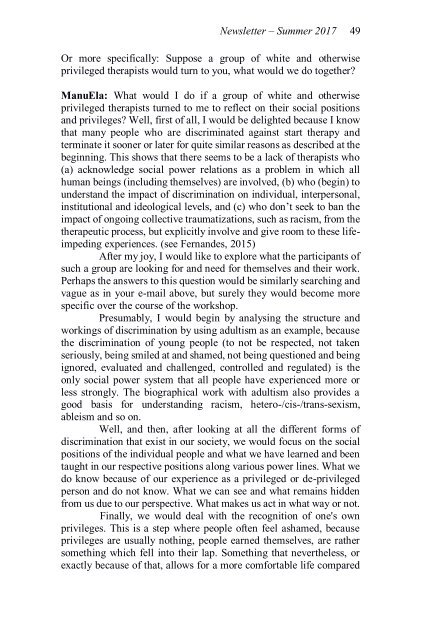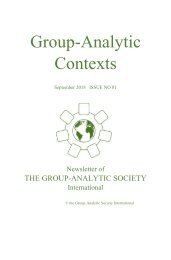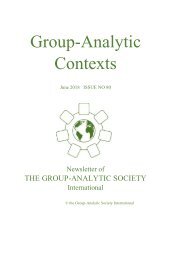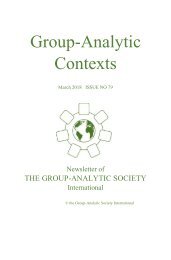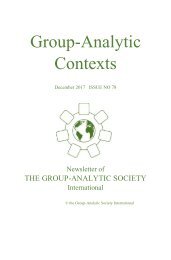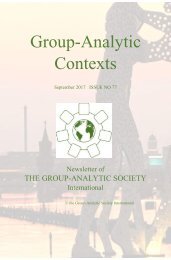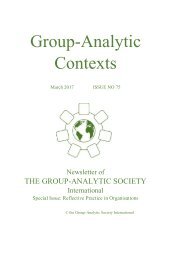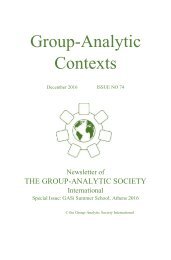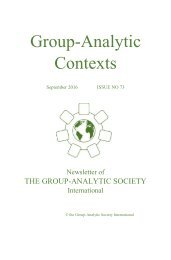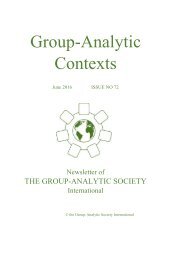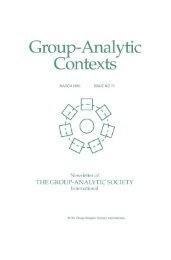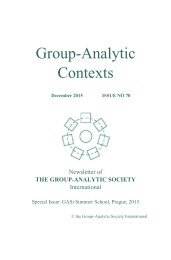Group-Analytic Contexts, Issue 76, June 2017
Special Issue: Preparing for the Berlin Symposium
Special Issue: Preparing for the Berlin Symposium
Create successful ePaper yourself
Turn your PDF publications into a flip-book with our unique Google optimized e-Paper software.
Newsletter – Summer <strong>2017</strong> 49<br />
Or more specifically: Suppose a group of white and otherwise<br />
privileged therapists would turn to you, what would we do together?<br />
ManuEla: What would I do if a group of white and otherwise<br />
privileged therapists turned to me to reflect on their social positions<br />
and privileges? Well, first of all, I would be delighted because I know<br />
that many people who are discriminated against start therapy and<br />
terminate it sooner or later for quite similar reasons as described at the<br />
beginning. This shows that there seems to be a lack of therapists who<br />
(a) acknowledge social power relations as a problem in which all<br />
human beings (including themselves) are involved, (b) who (begin) to<br />
understand the impact of discrimination on individual, interpersonal,<br />
institutional and ideological levels, and (c) who don’t seek to ban the<br />
impact of ongoing collective traumatizations, such as racism, from the<br />
therapeutic process, but explicitly involve and give room to these lifeimpeding<br />
experiences. (see Fernandes, 2015)<br />
After my joy, I would like to explore what the participants of<br />
such a group are looking for and need for themselves and their work.<br />
Perhaps the answers to this question would be similarly searching and<br />
vague as in your e-mail above, but surely they would become more<br />
specific over the course of the workshop.<br />
Presumably, I would begin by analysing the structure and<br />
workings of discrimination by using adultism as an example, because<br />
the discrimination of young people (to not be respected, not taken<br />
seriously, being smiled at and shamed, not being questioned and being<br />
ignored, evaluated and challenged, controlled and regulated) is the<br />
only social power system that all people have experienced more or<br />
less strongly. The biographical work with adultism also provides a<br />
good basis for understanding racism, hetero-/cis-/trans-sexism,<br />
ableism and so on.<br />
Well, and then, after looking at all the different forms of<br />
discrimination that exist in our society, we would focus on the social<br />
positions of the individual people and what we have learned and been<br />
taught in our respective positions along various power lines. What we<br />
do know because of our experience as a privileged or de-privileged<br />
person and do not know. What we can see and what remains hidden<br />
from us due to our perspective. What makes us act in what way or not.<br />
Finally, we would deal with the recognition of one's own<br />
privileges. This is a step where people often feel ashamed, because<br />
privileges are usually nothing, people earned themselves, are rather<br />
something which fell into their lap. Something that nevertheless, or<br />
exactly because of that, allows for a more comfortable life compared


